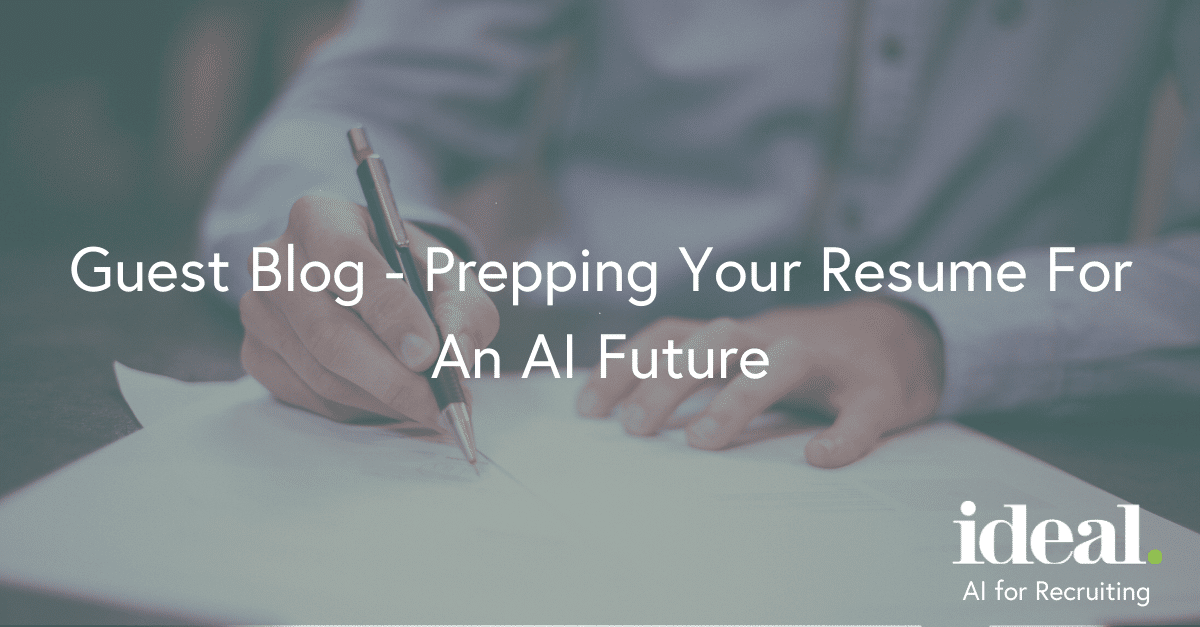Imagine getting a job without ever talking to a real person. A computer analyzes your resume using AI, thinks you’re a good fit, then sends gives you a test assignment.
You complete the assignment and the computer takes a read. Based on its data-crunching, it believes you will do the job well. A job offer arrives via email the next day with and address to show up at for day one.
We’re not quite in that reality, but one part of the process is already here: AI reviewing resumes and making judgements on which candidates might be a good fit.
In the ‘good old days,’ hiring managers skimmed resumes quickly. If you went to the right school, worked for the right company, or had the right last name, you got called in for an interview. Then along came scanning technology. In this second era of resume skimming, computers looked for matched keywords from the job description. If someone applied to a sales job and had variations of the verb “to sell” in their resume, they were more likely to get an interview.
Now AI has ushered in the third era of resume reading, and it puts the previous two eras to shame. Where a human may have looked with a bias towards status markers and a scanner read with a bias towards keywords, AI is digesting as much information as possible to predict if you’ll be a fit at the company and successful in the role for which you applied.
In short: AI is trying to think like an ideal human in order to help recruiters make better decisions about which candidates get interviews.
So what’s a job seeker to do?
Context is king, queen, prince, and princess
A good employee is not just someone who can perform their job, but also someone who will fit with the team, care about the company mission, help others, be fun to work with, learn quickly, want to learn and develop, have good self-assurance without being cocky, and a whole host of other “soft” skills. Whether you’re looking for technical or non-technical jobs in high demand, context is how you communicate that you’re not just a performer, but also a well-rounded potential employee.
For example, let’s say you’re applying to a sales role. You obviously need to document your sales successes. However, you should also explain what you did in order to get your success. Did you sell millions in product through cold calling? Lead generation webinars? Content marketing? Successful follow ups? What was your performance relative to everyone else? If you sold millions, did everyone else sell tens of millions… or only thousands?
By “showing your work,” to borrow a high school teacher phrase, you indicate that you can learn, you further show your strengths, and you offer the AI more insight to make a favorable prediction about you.
What’s the impact?
Continuing the sales job example, any salesperson would be expected to do certain tasks such as prospecting or using a CRM system. In your resume, explain what you did or can do that makes your approach helpful, better, more efficient, easier, or another positive trait.
Both qualitative and quantitative elements can help you here, using facts like your conversion rates or stories such as how you developed a unique style based on customer feedback.
Demonstrating impact shows what you were able to accomplish at each step of the journey. Selling a lot is a clear goal of a salesperson, but other factors such as time-to-sale or conversion rates can change the analysis from “fits the job description” to “intriguing candidate – learn more.”
What’s in a human?
One of the fundamental things AI tries to do is think and predict like a human would under ideal circumstances. While this doesn’t mean it’s bias-free, it means that AI technology will increasingly try to predict if candidates have the necessary skills for the future of work. One study identified those skills as the ability to learn quickly (especially new digital tools), think critically, and communicate clearly. No matter your job, if you can’t do those things, you may not succeed in your role long-term.
So, similar to why candidates used to keyword stuff or status-signal, give the AI what it wants.
Show that you’ve learned something new (quickly). Demonstrate that you know how to think critically and communicate changes effectively. If you took the lead on something, own that. If you were on a team, be clear about your contributions and what you learned. Weaving subtle stories throughout work experiences and examples lets anyone (or any tech) reading your resume know that you’re a whole-human, not just a living work machine.
As AI gets better at making decisions, there are no doubt some challenges that job seekers will face as we all learn to navigate the future. However, it opens one major opportunity: showing more humanity. Resumes can sometimes feel like the most transactional part of any job search, but imbuing your resume with context, a focus on impact, and showing your humanity will help you navigate the murky waters of job searching in an AI future.
The post Guest Blog – Prepping Your Resume For An AI Future appeared first on Ideal.
